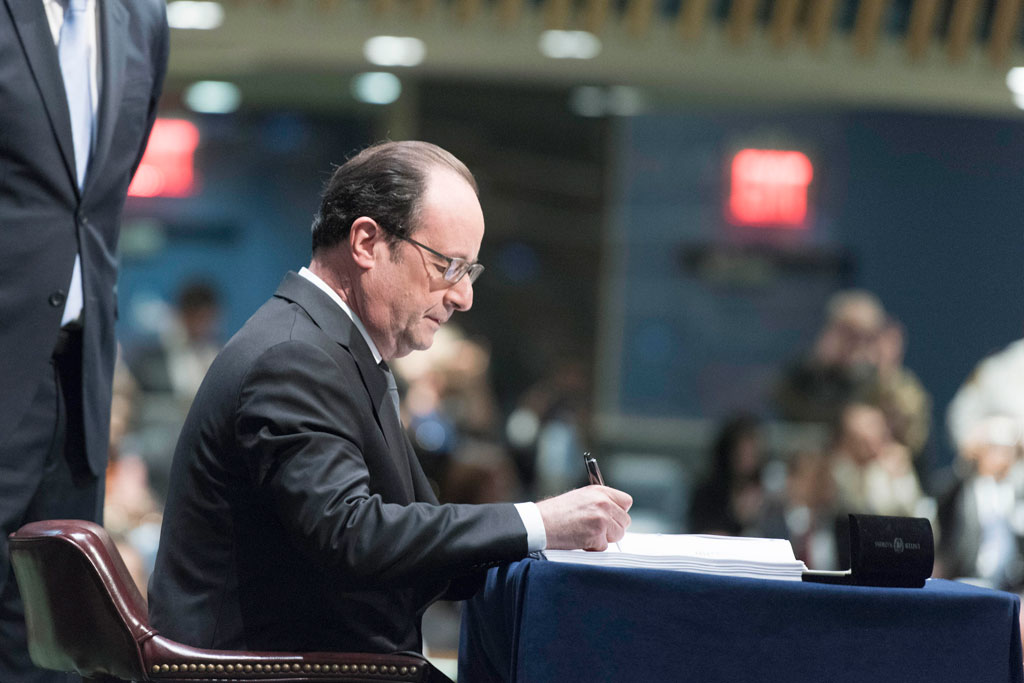
Today I will join world leaders in ratifying the historic climate agreement we negotiated in Paris last December. After years of campaigning on this issue, it is with great pleasure that I will sign the Republic of Gabon up to the initiative; but, once the ink dries on that agreement, the real work begins.
One crucial tension at the heart of the COP21 Paris Agreement’s future success may not much feature in these proceedings: how the developing world improves the standard of living for its people totally in contrast to how western nations did through rapid industrialization. Yet it is the crucial challenge for my country and my continent.
Until now, progress towards meaningful action has been slow because powerful leaders in developed countries have feared the cost of reducing their nations’ heavy dependence on burning fossil fuels. Newly emerging economies similarly relied on non-renewable energy sources to achieve astonishing rates of growth and, too often, felt able to wash their hands of responsibility for tackling global pollution.
Finally, in December 2015, we acknowledged the world is at a tipping point where irreparable damage is being done, and we cannot continue this way.
Importantly, the Paris talks also highlighted that developed nations were closing the path to growth that they pursued, expecting the rest of the world to find its own way without reasonable support. Consequently, more advanced economies need to increase their efforts to extend technological and financial assistance to the developing world; this is the price of our shared responsibility.
However, the real solutions will not come solely from the West. Countries like Gabon, the continent of Africa, and the whole global south have an opportunity to lead in this transformation as well.
Climate change is a security threat that Africans have had to deal with all of our lives. In fact, the continent has been dealing with the consequences of changing temperatures for thousands of years. Around 500 B.C. a phase of climate change sparked the mass movement of my people, the Bantu; when hot dry conditions degraded the environment and sparked forest fires, my ancestors were driven from their homeland to travel the length and breadth of Africa. Indeed, even today many of my countrymen can understand the language of our brothers the Zulu, who migrated from Central Africa to South Africa at this time!
As we look to the future, we cannot improve our living standards while simultaneously degrading the natural environment around us. If we do, we will certainly face a similar climate migration, sparking a humanitarian crisis. Africa is going to have to walk a tightrope if we are to achieve sustainable growth.
Across the continent, we must find solutions together. Gabon has been an early advocate for Green policy and south-to-south exchanges. Our first environmental protection laws stretch back to 1993, immediately after the first Rio Summit. Building a ‘Green Gabon’ has always been a central pillar of my government, and in 2014 I introduced a new legal framework that puts environmental protection and sustainable development firmly at the heart of our future economic growth.
Yet we cannot simply stop production of fossil fuels; as President of an oil-producing country, I have great hopes about continuing to responsibly find and develop both oil and gas in the future. But an economy reliant on hydrocarbons is not sustainable and this is why I have gone to great efforts to bring economic diversification, particularly building up the country’s timber, agriculture and ecotourism sectors. Working in this way, over the longer term, we can generate new jobs in dynamic sectors that will spur growth.
Gabon is in a unique position today—we are rich in minerals, oil and gas, and yet our natural environment is still relatively pristine. Our National Climate Change Action Plan has developed an approach to preserve the rain forests that cover 88 percent of our territory and to manage the emissions resulting from our industrial activities.
We know we have to integrate climate sensitivity and responsibility into all of our sectorial development strategies; the result is a low carbon development strategy that can be a blueprint for other nations and bring the high skilled jobs our future will require.
Conserving our natural environment, while not limiting economic opportunities for our people—that is the global challenge today; a challenge that requires new models of doing business, models that we all recognise are necessary, but which many of us still struggle to embrace.
If every country’s climate policy was driven purely by environmental science, we may have no need for international agreements. But this has always been about economics. The processes that advanced most Western economies are the ones now seen to threaten its future. So it is right that they spur more green investment in the global south. But the solutions must come from us, supported by northern economies.
With each new project, we can build our collective knowledge on sustainable development, and ensure we do not repeat the mistakes of the industrialized past.












